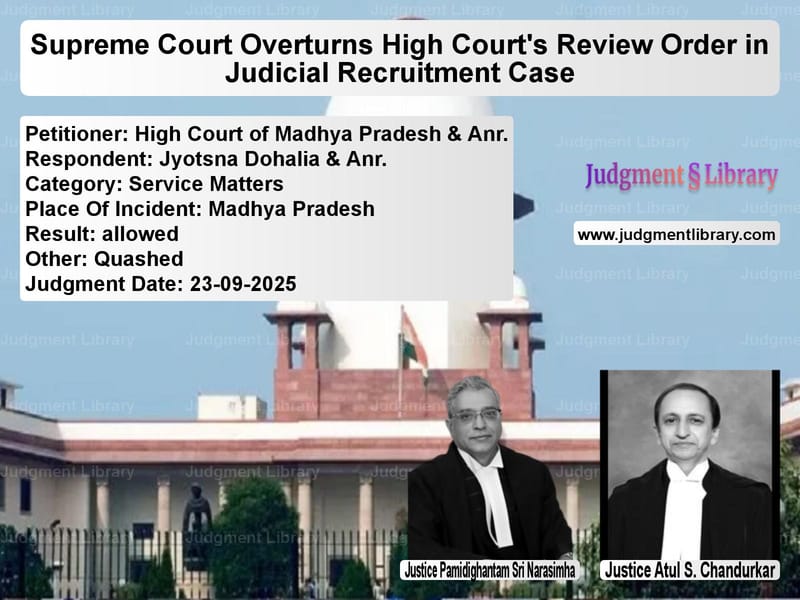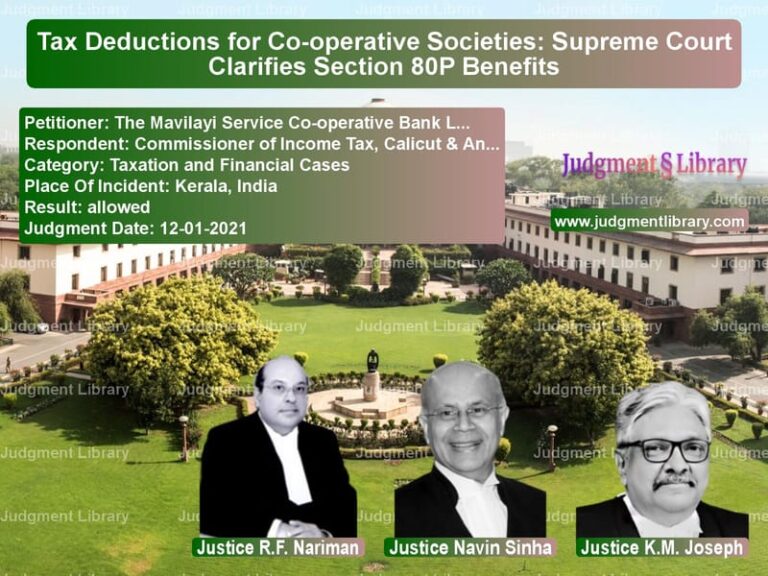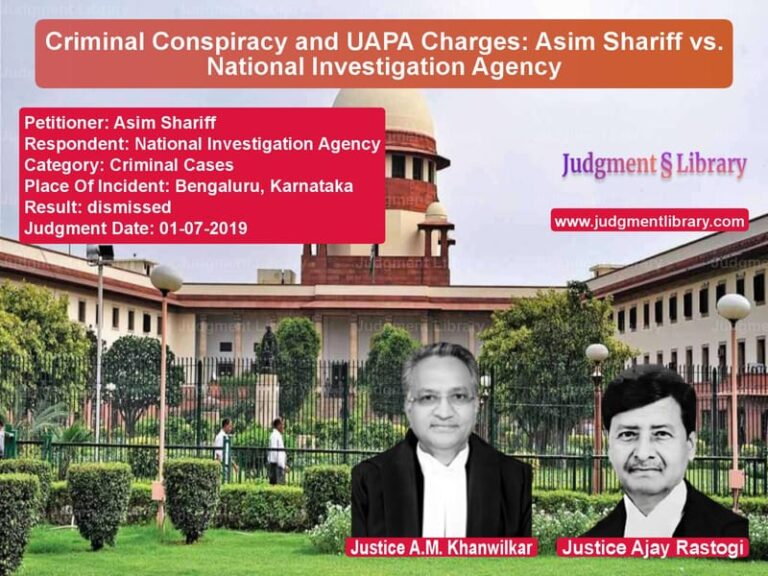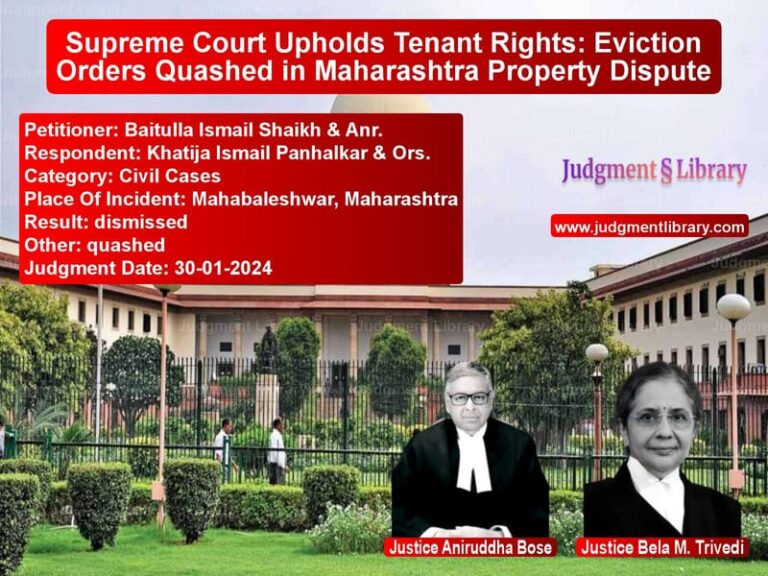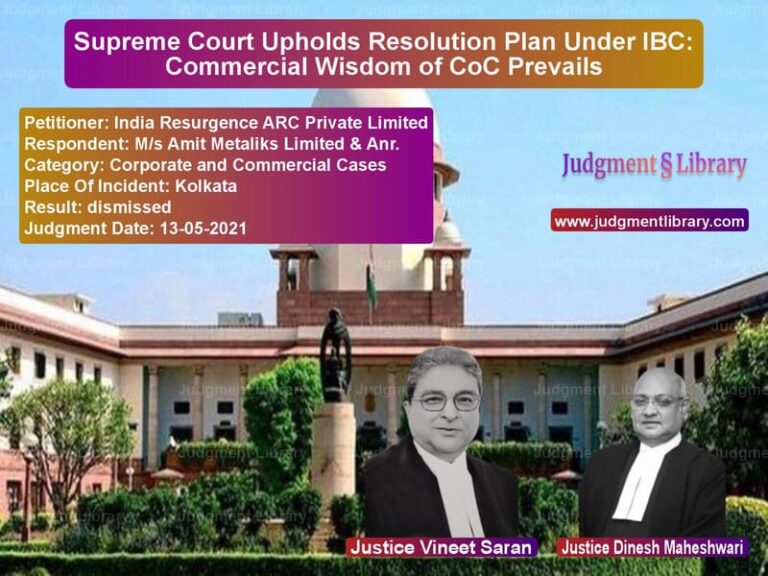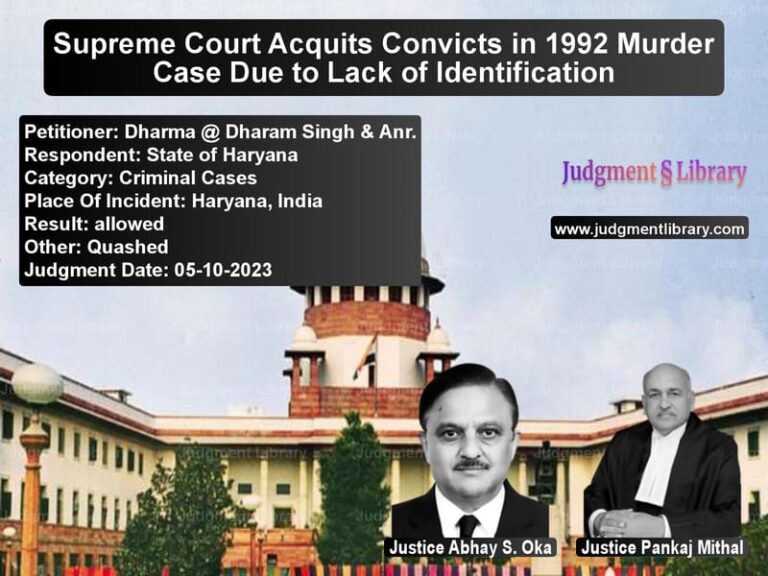Supreme Court Overturns High Court’s Review Order in Judicial Recruitment Case
The Supreme Court of India recently delivered a significant judgment concerning the recruitment process for Judicial Officers in Madhya Pradesh. The case, Civil Appeal No. of 2025, arose from a Special Leave Petition filed by the High Court of Madhya Pradesh challenging an order passed by its own Division Bench in review jurisdiction. The dispute centered around the eligibility criteria for the post of Civil Judge (Entry Level) and the subsequent direction to re-compute cut-off marks and conduct a fresh main examination.
The Background of the Case
The recruitment of Judicial Officers in Madhya Pradesh is governed by the Madhya Pradesh Judicial Service (Recruitment and Conditions of Service) Rules, 1994. In June 2023, Rule 7 of these Rules was amended, introducing stricter eligibility criteria. Candidates from the General and Other Backward Classes categories now needed either three years of continuous legal practice or at least 70% marks in their first attempt in their LL.B. degree. For Scheduled Caste and Scheduled Tribe candidates, the requirement was 50% marks in the first attempt.
In November 2023, the High Court issued an advertisement to fill approximately 199 posts of Civil Judge. The validity of the amended Rule 7 was challenged in various writ petitions. The Supreme Court, in an interim order in December 2023, permitted all candidates who were eligible under the pre-amended rules to participate in the recruitment process, subject to the final outcome of the challenge to the rules’ validity.
The preliminary examination was held, and the results were declared in March 2024. The respondents in this case, Jyotsna Dohalia and another, scored 112 and 108 marks respectively, falling short of the cut-off mark of 113. Consequently, they were not allowed to appear for the main examination. Their writ petition challenging the preliminary result was dismissed by the High Court on May 7, 2024. The court noted that they had not secured the cut-off marks and thus could not be permitted to proceed further.
The Review Petition and the Impugned Order
Unsatisfied, the respondents filed a review petition. On June 13, 2024, a Division Bench of the High Court, in exercise of its review jurisdiction, recalled its earlier order. The review court held that the order dated May 7, 2024, suffered from errors. It expressed concern that ineligible candidates, who had been provisionally allowed to appear due to the interim order, might secure appointment. To remedy this, the High Court directed the exclusion of all such ineligible candidates who had passed the preliminary examination. It further directed the re-computation of the cut-off marks by applying the ratio of 1:10 and ordered a fresh main examination for eligible candidates who now fell within the new cut-off range. The ongoing recruitment process was stayed until this exercise was completed.
Arguments Before the Supreme Court
The appellants, the High Court of Madhya Pradesh through its Registrar General, argued that the review court had exceeded its jurisdiction. The learned counsel for the appellants, Mr. Ashwani Kumar Dubey, submitted that the validity of Rule 7(g) had already been upheld when the writ petition was decided. The respondents had not secured the cut-off marks, and there was no basis to re-open the proceedings. He argued that the review jurisdiction was misused to re-consider a matter that had been duly adjudicated, which was permissible only in an appeal, not a review. He relied on judgments in Northern India Caterers Vs. Governor of Delhi and Kamlesh Verma Vs. Mayawati to underscore the limited scope of review.
Mr. Dubey further contended that the entire exercise was based on an incorrect premise that ineligible candidates would be appointed. He asserted the appellants’ specific stand that no ineligible candidate would be considered for appointment. He also pointed out that the candidates who had successfully cleared the preliminary examination were not made parties to the review petition, and the impugned directions caused them prejudice. Relying on Canara Bank Vs. Debasis Das, he emphasized the necessity of impleading necessary parties. He also highlighted the inordinate delay, as the advertisement was for 2022 vacancies and the review order was passed in 2025.
On the other hand, the learned counsel for the respondents, Mr. Rohit Amit Sthalekar, supported the impugned order. He argued that since all candidates, regardless of their eligibility under the amended rules, were allowed to appear for the preliminary exam, the resulting cut-off was artificially high. If ineligible candidates were weeded out, the cut-off marks would be reduced, potentially allowing the respondents a chance to appear for the mains. He distinguished between eligibility criteria and cut-off marks, arguing that the latter were not sacrosanct. He also cited the fact that the High Court had already conducted a second main examination for physically impaired candidates, setting a precedent for holding an additional exam.
The Supreme Court’s Analysis and Decision
The Supreme Court, after hearing both sides at length, set aside the impugned order of the High Court. The bench comprising Justices Pamidighantam Sri Narasimha and Atul S. Chandurkar held that the High Court had exceeded its jurisdiction in reviewing the order dated May 7, 2024.
The Court noted that in the original writ petition, the respondents’ contention regarding the re-computation of cut-off marks was based merely on an “apprehension”. The High Court, in its order dated May 7, 2024, had explicitly considered and rejected this argument. The Court reproduced a crucial paragraph from that judgment:
“4. However, it is argued before this Court that the preparation of the preliminary examination result was in pursuance to the unamended rules as the interim relief was granted and all the candidates were permitted to continue. However, the cut off was 113 marks and it is an admitted position that both the petitioners have not achieved the target… It is only an apprehension of the petitioners that once the validity of the amended rules has been upheld by the Division Bench of this Court as well as by the Hon’ble Supreme Court then there will be a scrutiny of the candidates which will be done prior to preparation of the main results and all those candidates who are not having the benchmark in terms of the amended rules they will be thrown out of the final list. Therefore, there is every possibility that the petitioners may have chance now of achieving the benchmark, but the fact remains that the petitioners could not even attain the cut off marks in the preliminary examination… In absence of any explanation that could be given by the petitioners to the aforesaid, no benefit could be extended to them.”
The Supreme Court observed that since this contention had been expressly considered and negatived, it was not open for the review court to re-consider the same issue and take a different view. “Such exercise could have been undertaken only in exercise of appellate jurisdiction and not in exercise of review jurisdiction,” the Court held.
The Court also found that the review court’s premise was flawed. The apprehension that ineligible candidates would be appointed was addressed by an affidavit filed by the Registrar of the High Court, which clearly stated that “no ineligible candidate who had been declared successful in the main written examination would be considered” for interview. Thus, the very foundation of the review order was rendered baseless.
Furthermore, the Court distinguished the case of the second main examination held for physically impaired candidates, noting that its scope was distinct and restricted only to that specific category, and could not be used as a precedent for the respondents’ case.
The Final Outcome
For all these reasons, the Supreme Court allowed the appeal, set aside the High Court’s order dated June 13, 2024, and dismissed the review petition filed by the respondents. The appellants were directed to conclude the recruitment process initiated pursuant to the November 2023 advertisement at the earliest. The judgment reinforces the settled legal position on the narrow confines of review jurisdiction, preventing it from being used as a disguised appeal to re-hear matters on merits.
Petitioner Name: High Court of Madhya Pradesh & Anr..Respondent Name: Jyotsna Dohalia & Anr..Judgment By: Justice Pamidighantam Sri Narasimha, Justice Atul S. Chandurkar.Place Of Incident: Madhya Pradesh.Judgment Date: 23-09-2025.Result: allowed.
Don’t miss out on the full details! Download the complete judgment in PDF format below and gain valuable insights instantly!
Download Judgment: high-court-of-madhya-vs-jyotsna-dohalia-&-an-supreme-court-of-india-judgment-dated-23-09-2025.pdf
Directly Download Judgment: Directly download this Judgment
See all petitions in Recruitment Policies
See all petitions in Employment Disputes
See all petitions in Public Sector Employees
See all petitions in Judgment by P.S. Narasimha
See all petitions in Judgment by Atul S. Chandurkar
See all petitions in allowed
See all petitions in Quashed
See all petitions in supreme court of India judgments September 2025
See all petitions in 2025 judgments
See all posts in Service Matters Category
See all allowed petitions in Service Matters Category
See all Dismissed petitions in Service Matters Category
See all partially allowed petitions in Service Matters Category

